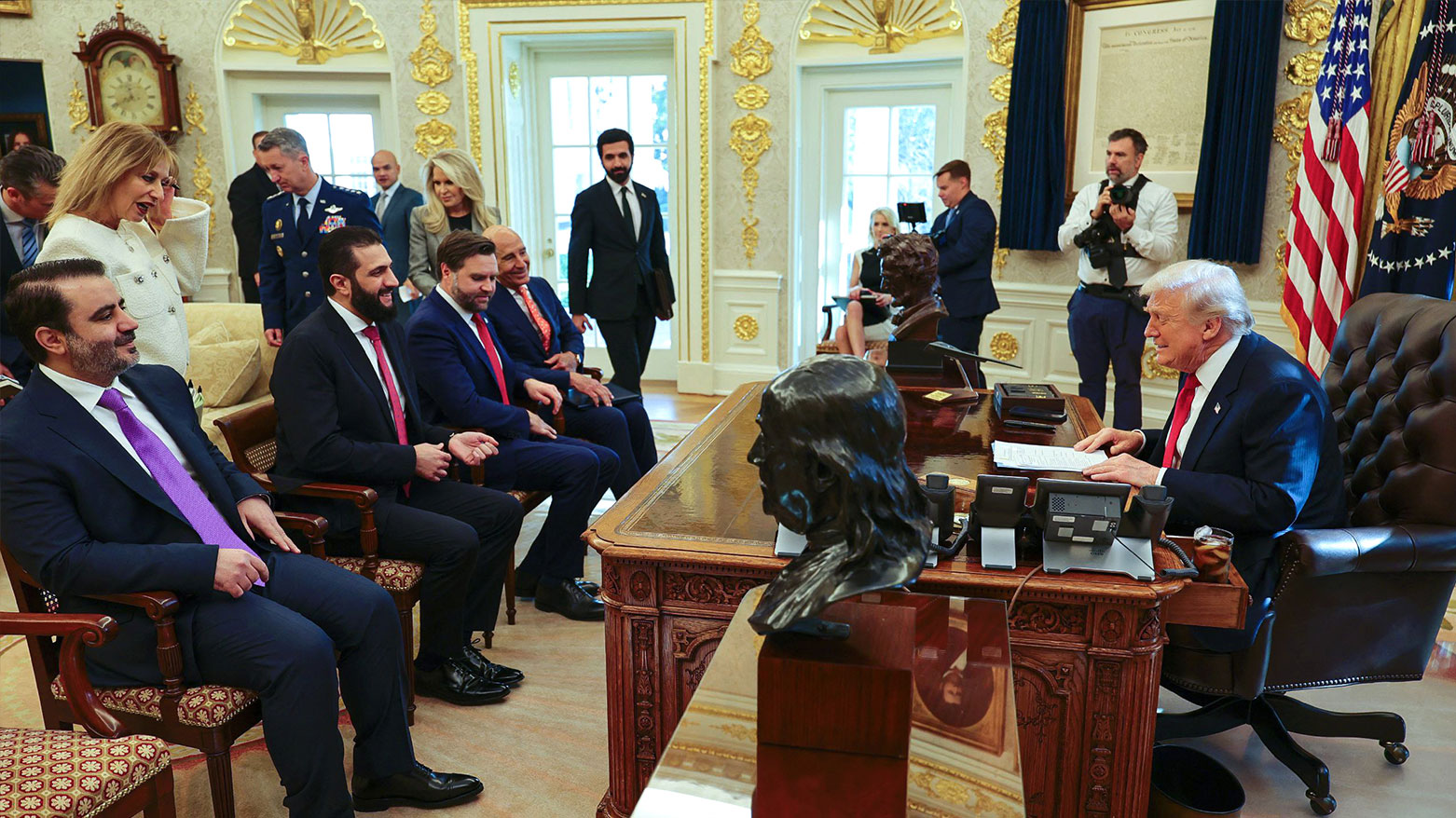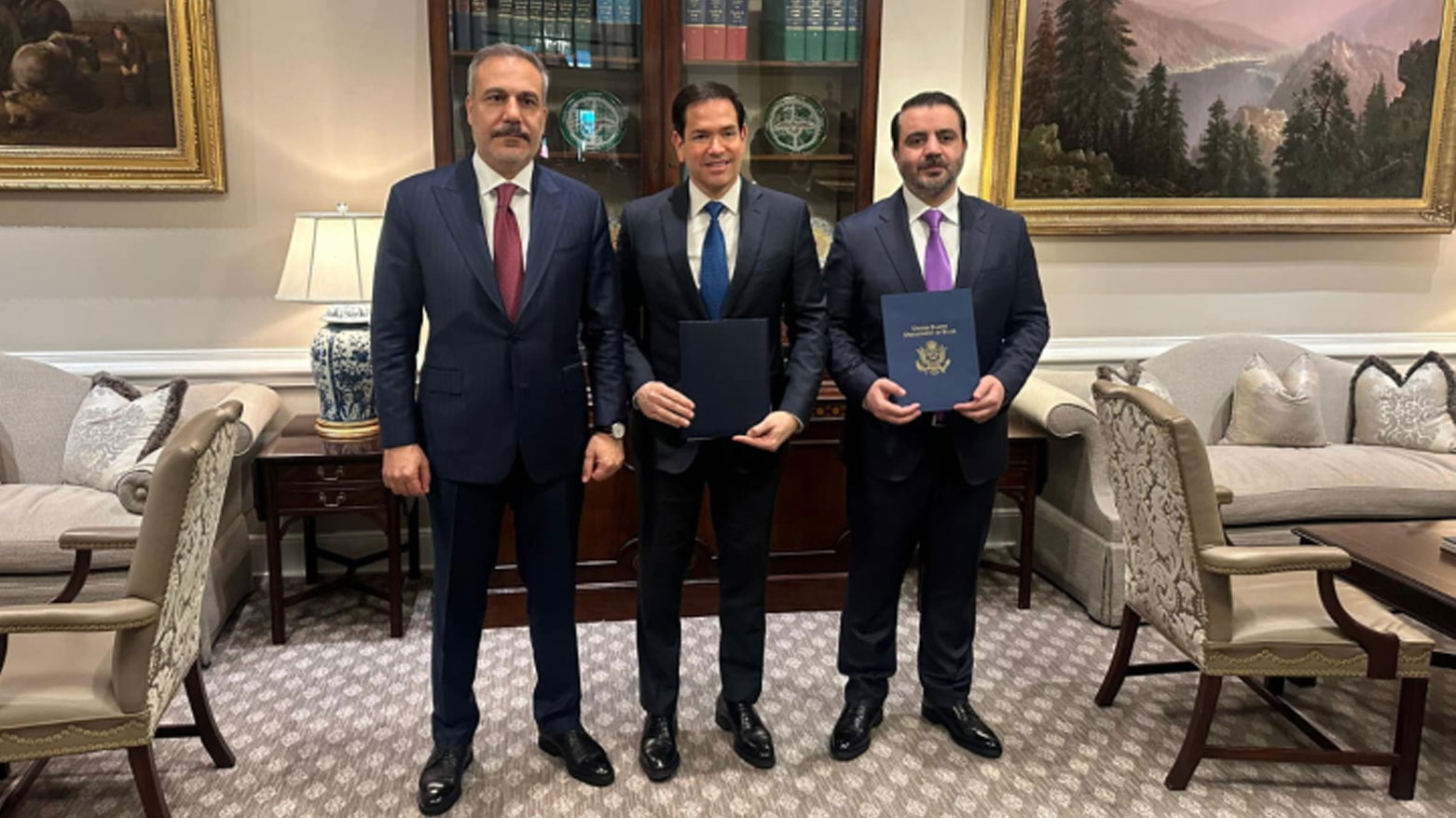Damascus Secures Key Demands: Sanctions Pause and SDF Army Integration Discussed at White House
Syrian President al-Sharaa secured US sanctions relief and a trilateral framework with Turkey in a historic White House meeting, including SDF integration into the Syrian Army.

ERBIL (Kurdistan24) – In a shift in Middle East diplomacy, Syrian President Ahmed al-Sharaa was formally received at the White House by U.S. President Donald Trump on Monday, marking the first official visit by a Syrian leader to Washington since Syria’s independence. The landmark summit culminated in a U.S. commitment to suspend Caesar Act sanctions and the establishment of a trilateral cooperative framework with Türkiye aimed at advancing security, reconstruction, and national unity in Syria.
According to the Syrian Ministry of Foreign Affairs and Expatriates, the talks between Presidents al-Sharaa and Trump were conducted in a “friendly and constructive atmosphere.” Discussions focused on Syria’s post-conflict recovery, the unification of national institutions, and the integration of the Syrian Democratic Forces (SDF) into the Syrian Arab Army — a move described by both sides as central to consolidating national stability.
Following the presidential meeting, a high-level trilateral session was held at the White House between Syrian Foreign Minister Asaad Hassan al-Shaybani, U.S. Secretary of State Marco Rubio, and Turkish Foreign Minister Hakan Fidan. The talks sought to operationalize the new agreements and coordinate the implementation of the March 10 framework. This new alignment, involving Washington, Damascus, and Ankara, marks a major geopolitical shift with potential implications for regional security and economic recovery.

In an official communiqué issued by Damascus, the Syrian Foreign Ministry emphasized that President Trump expressed admiration for Syria’s “new leadership” and praised its “achievements in restoring stability and liberating territories.” Trump reportedly affirmed Washington’s readiness to “provide the necessary support” for Syria’s reconstruction and development efforts in the coming phase.
The statement further detailed that, under President Trump’s direction, an expanded working session was held between Foreign Ministers al-Shaybani, Rubio, and Fidan to “establish clear implementation mechanisms” for the agreements reached at the presidential level. The United States also confirmed its support for a potential security understanding between Syria and Israel aimed at enhancing regional stability.
On the economic front, the U.S. administration expressed readiness to lift sanctions imposed under the Caesar Act, paving the way for investment opportunities and financial recovery in Syria. The meeting concluded with an exchange of commemorative gifts, reflecting what Damascus described as “a spirit of openness and mutual respect” and a shared intention to build “a new page in Syrian-American relations.”
The U.S. Department of State officially confirmed the decision to suspend the Caesar Act sanctions following the fall of the former Syrian regime. In a statement, the Department declared:
“The Department of State continues to deliver on President Trump’s promise to provide the Syrian people with the opportunity for lasting peace and prosperity. Today, I issued a suspension of mandatory Caesar Act sanctions based on the actions taken by the Syrian government following the fall of the al-Assad regime.”
The statement reaffirmed Washington’s expectation that Damascus would demonstrate “concrete actions” to turn the page on its past and advance peace and stability in the region.
Turkish Foreign Minister Hakan Fidan, who participated in the Washington meetings, described his engagements with U.S. and Syrian officials as “comprehensive and constructive.” Speaking to the press following his return, Fidan said he was invited to the White House for joint discussions with Secretary Rubio, U.S. Special Representative for the Middle East Steve Witkoff, and U.S. Ambassador to Ankara and Special Representative for Syria Tom Barrack.
Fidan confirmed that his visit coincided with President al-Sharaa’s and that he attended a portion of the Syrian leader’s meeting with President Trump, where he conveyed greetings from Turkish President Recep Tayyip Erdoğan. “We discussed Türkiye’s general views on Syria and opportunities for cooperation with the U.S.,” Fidan noted, emphasizing that the talks covered “many issues related to Syria’s development, unity, solidarity, and the region’s security.”
During subsequent meetings with Rubio, al-Shaybani, and U.S. Vice President JD Vance, the Turkish minister said discussions addressed the management of “problem areas” in Syria’s north, northeast, and south. Fidan warned that if these issues were not carefully managed, Syria’s “territorial integrity could face new risks,” underscoring the importance of cooperation between Ankara, Washington, and Damascus to prevent further fragmentation.
He added, “It is important that the Americans understand that Syria must remain one and whole, and that all ethnic and religious groups enjoy security and freedom without fear. Finding this golden ratio is essential.”
Fidan also highlighted the significance of continued coordination with U.S. envoy Tom Barrack, saying that the American diplomat “plays an essential role in facilitating dialogue and managing relations” among all parties concerned.
In an exclusive interview with Fox News following his White House visit, President al-Sharaa elaborated on the new era in Syrian-American relations. Speaking to correspondent Jillian Turner, the Syrian leader described his meeting with President Trump as “historic” and said it symbolized Syria’s reintegration into the international community after decades of isolation.
“For the first time since Syria’s establishment, a Syrian president has been received at the White House,” al-Sharaa said. “After the fall of the former regime, Syria has entered a new era. This visit builds a new strategy with the United States.”
When asked about cooperation in combating ISIS, al-Sharaa underscored Syria’s sacrifices in the fight against terrorism. “We participated in many battles against Daesh and lost much of our forces,” he said. “The U.S. military presence in Syria now needs to be coordinated with the Syrian government, and we must reach a new agreement on these matters.”
Responding to questions about his former affiliation with extremist groups, al-Sharaa described that period as “a matter of the past,” stating, “We did not discuss it actively. We talked about the present and the future — about investment opportunities and Syria’s economic recovery. Syria is no longer a security threat but a geopolitical ally.”
On potential peace talks with Israel, al-Sharaa clarified that while Syria supports stability, it is “not ready for direct negotiations” at this stage. “Syria’s situation is different from the countries that joined the Abraham Accords,” he said. “Israel still occupies the Golan Heights since 1967. Perhaps President Trump’s administration will help us reach a suitable framework in the future.”
Addressing the issue of accountability for former President Bashar al-Assad, al-Sharaa said his government had established a “traditional justice commission” to ensure justice for all victims of the conflict. “Justice must prevail,” he said. “Everyone responsible will be held accountable, including Bashar al-Assad.”
On humanitarian matters, al-Sharaa expressed deep empathy for the families of missing persons, including American journalist Austin Tice, who disappeared in Syria in 2012. “We have more than 250,000 people who went missing during the war,” he said. “I met with Tyson’s mother, and I understand her pain. I will do everything in my power to help families like hers find answers.”
Off-camera, journalist Amy Goodman revealed that President al-Sharaa described his White House meetings as “amazing” and disclosed that President Trump presented him with a signature “Make America Great Again” hat as a personal gift.
The historic White House meeting represents a potential turning point in Syria’s international standing. With the suspension of U.S. sanctions, renewed diplomatic recognition, and a trilateral framework involving Türkiye and the United States, President al-Sharaa’s visit marks the beginning of a new phase in Syria’s political and economic rehabilitation.
While challenges remain — including reconciliation between Kurdish forces and Damascus, regional security concerns, and the path toward national reconstruction — the developments in Washington signal the start of a dialogue-based approach to stability in Syria, reshaping regional alliances and redefining U.S. engagement in the Middle East.